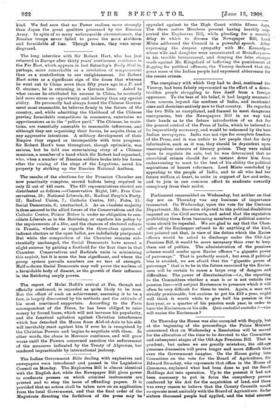The results of the elections for the Prussian Chamber are
now practically complete, second ballots being required in only 25 out of 443 seats. The 418 representatives elected are distributed as follows :—Conservative Right, 140; Free Con- servatives, 58; National Liberals, 65; Radical People's Party, 22; Radical Union, 7; Catholic Centre, 100; Poles, 15 ; Social Democrats, 6; unattached, 5. As an absolute majority if thus assured to the allied forces of the Conservatives and the Catholic Centre, Prince Billow is under no obligation to con- ciliate Liberals as in the Reichstag, or regulate his policy by the requirements of a bloc, and the chances of electoral reform in Prussia, whether as regards the three-class system of indirect electors or the open ballot, are indefinitely postponed. But while the composition of the Chamber remains sub- stantially unchanged, the Social Democrats have scored a slight success by gaining a foothold for the first time in that Chamber. Conservatives and Radicals unite in minimiaing this exploit, but it is none the less significant, and where the group system prevails numbers are no test of strength. Half-a-dozen Social Democrats may well prove the nucleus of a formidable body of dissent, as the growth of their influence in the Reichstag amply proves.






































 Previous page
Previous page